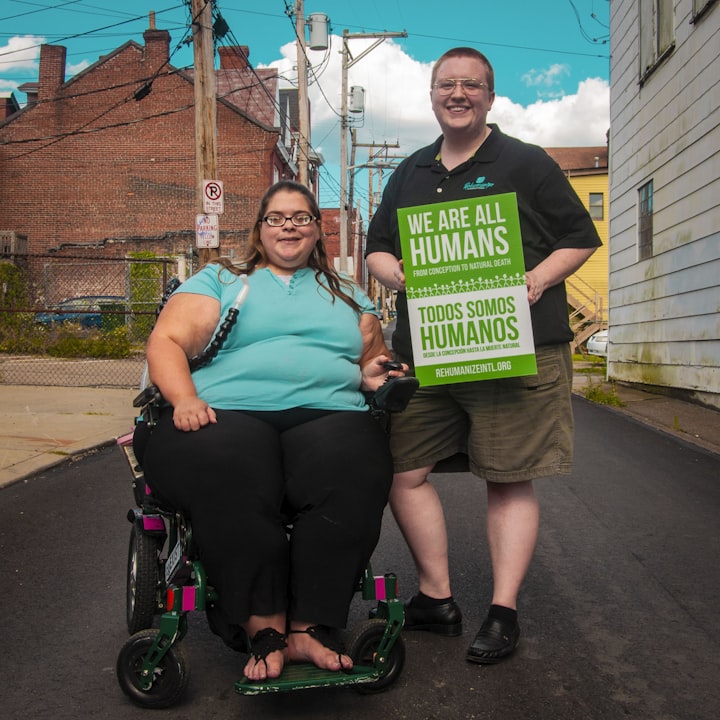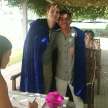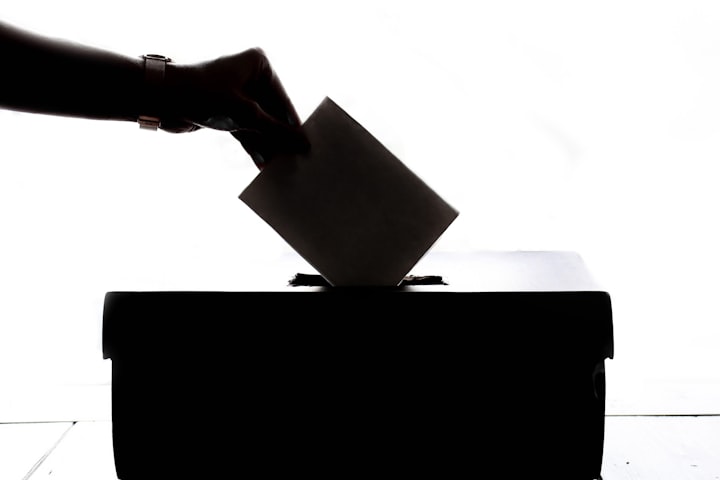
The Beginning
As someone suffering from Autism, I have had to support myself since I was 18 years old because of my mother’s death at age 49. Job opportunities have been difficult to come by because of my disability.
This has been compounded by me developing a condition known as ME, or Chronic Fatigue Syndrome. This causes tiredness in an individual after exertion. On good days, you may function normally. On the bad days, you may be unable to get out of bed to use the toilet.
Autism creates its own barriers, but I do not see it personally as a disability per se, but a different way of being. I can sense emotions, feel what people feel. I can get overwhelmed in a crowd as sensory stimuli from noise to fabric sensations are amplified, and social situations require significant effort. I sometimes neglect my own self-care.
So I spent my life living on social security and then doing freelance writing work. I also consider myself a spiritualist. I have always sought the deeper meanings of life, wanting to unpack the great mysteries. Why are we here? What is our purpose in life?
Finding Love
I have always had a passion for making people smile; it is rewarding. I also love caring for people. This was tested when I became a full-time carer for a friend of mine, who suffered severe mental health problems and had been sectioned previously. As someone with my own care needs, my care for him involved helping him maintain his personal safety. I would prevent him from carrying out self-harm or self-destructive behavior. Meanwhile, I received care from others when I needed it.
Around this time in 2018, I dated someone who lived on the other side of the world. With support, I flew out to meet him in the Philippines. He had a love of caring for people, too. We hit it off, despite my poor health causing problems in the hot climate. We laughed together. He cared for me while I was there and shared moments of compassion towards the local homeless when we did go out. Those qualities are what I fell in love with.
After a year, we were married. We were not well off at all, so we had a small wedding at the British Embassy in Manila, and our Filipino friends bought us KFC at a highway services on our way back home.
We did not have a lavish or expensive wedding, but our love for each other cemented the marriage. He was understanding, caring and compassionate. He treated me the same and looked past the disability.
My disability meant we were exempt from the strict UK Spouse Visa income requirements, and after selling a lot of what we owned, we paid the expensive visa application fees. The visa was accepted a few months later, and he arrived in the UK in July 2019.
The Job Offer
When my partner arrived in the country, the realities of marriage did not worry us one bit. We grew even closer. My partner did volunteer work at a charity shop. I continued caring for my friend while my health went up and down like a yoyo, as Chronic Fatigue Syndrome can do.
The charity shop manager where my partner was volunteering had put her mother, who suffered from Dementia, in a local nursing home. She offered to get my partner an interview in December of 2019 with the manager there.
As my partner was new to the country, I offered to accompany him to the interview. He was suited up as is typical for interviews, and I was dressed in my autism comfort clothes; sweatpants and a tee-shirt. Those clothes are some of the few things I can wear without feeling very uncomfortable.
When we enter the interview office, we were greeted by the manager and the care home’s head nurse. They interviewed my partner, and he passed with flying colors. But then we got talking, as you do over a cup of tea in the office.
I explained that I love the idea of caring for people, of looking after them. I explained my health, the inability to wear many uniforms, and how my autism difficulties are a problem for many employers. I explained how I had only ever been self-employed or on social security at the age of 25, and I had no employer reference as a result.
A Seed is Planted
The disabilities did not deter either the manager or the head nurse, who doubled up as the deputy manager. They explained that despite the disability, they would be more than happy if I wanted a job to make adaptations. This included allowing me to wear clothes comfortable to me, additional rest breaks, and working on the bank. They would allow me to pick shifts around the health conditions, so my shift pattern would vary depending on my condition’s severity when booking them.
The managers gave me a chance, and in this act of kindness, a seed was planted. I was offered a job at the same time as my partner. Both managers showed us around the care home, which was home to residents with Dementia and those with severe physical impairments.
I met the residents and could feel the emotions of each and every one of them. On one end of the spectrum was a resident who was a former cat breeder who could tell you all about cats but would forget the physical actions required to do tasks.
On the other end of the spectrum was a lady who had severe Dementia and exhibited Challenging Behaviour. I met some bed-bound residents, mostly stroke victims. I got to know them and was able to talk to them about life if they could speak.
Memories of Hiroshima
And so it was over the next two months, my partner and I worked at this nursing home, and I got to grips with the work environment. The disability adaptations such as extra rest breaks and even breaks between residents for re-orientation after sensory overload made the job possible. On days off, I would recover as was required with Chronic Fatigue Syndrome.
Working with Dementia can be challenging but also rewarding. It was what you would expect from this type of work, such as helping them use the toilet, encouraging or assisting with food, putting them to bed, and helping them get up.
There was, however, an aspect of care that is not often talked about. That is, of course, having empathy and understanding towards the residents. As someone fascinated with spirituality and why we are here, I came up with a description of what Dementia is to the person based on my observations.
I describe someone suffering from Dementia as a car driver. The soul is the driver sat at the wheel. Dementia is where parts of this car break down and fall apart. The real person is still there, but the windscreen fogs up so they cannot understand the road they travel. The wing mirrors fall off, and the engine begins to fail as they lose their mobility. But, they are still people who can feel the entire spectrum of human emotions. Only when they pass away do they leave the car into the larger mystery of the world beyond.
Caring for each resident would involve learning their unique language, as I call it. This is their unique cues, passions, dislikes, and even their body language and facial expressions. Dementia patients require you to learn that unique language so you can effectively communicate and reassure them. This takes time, empathy, and even a bit of trial and error. I had found my passion. The seed planted from the kindness of the managers had started to sprout.
Many Dementia patients retain memories and even pains that come out at random moments that require your input or even just your ear. This happened with one such resident, who could have a conversation with you and even had physical mobility. He had lost his sense of what he was doing, many memories, and his ability to look after himself.
While changing him in the bathroom, he suddenly came out with memories of his time serving in the military. He had witnessed the Hiroshima mushroom cloud from a distance when the atomic bombs were dropped in August 1945.
He also expressed his regrets about lives taken during the horror of war. What he needed was compassion, understanding, and no judgment. In giving that, what could have been a challenging time changing him was made a lot easier, and each time care was given could be an educational experience for those willing to learn.
I found the physical side of care very challenging, with many rest periods needed, but every smile I saw on the residents’ faces made it worthwhile. But those joyful moments never could have been shared had it not been seeded by the managers giving me a chance. Every good deed done in the world can ripple outwards far beyond the original act. Their kindness towards the staff continued as the world entered its darkest time since World War II.
The Coronavirus Pandemic
In January 2020, news of a novel Coronavirus had started to spread. Life continued as usual at first. I had established myself in the job and, despite disability setbacks, loved the work. Our workload was about to significantly increase, as was our resolve.
It didn’t take long for us to realize that this virus could be quite lethal, but the true nature was hard to ascertain. Care homes were on red alert, and it became clear that we may be taking a risk to our lives, and the lives of the residents could hang in the balance as the virus was killing people, but at what rate we did not know.
In March 2020, the UK government put us into a national lockdown to slow the virus spread. Meanwhile, all visitations with families had to be suspended when the care homes were locked down. This would also be a test of my marriage, which passed with flying colors. Being stuck in the house and at work together bought my partner and me even closer.
Suddenly we, as well as the residents, were in a strange environment. We had residents dropping like flies, though the causes of death varied. We wore PPE daily, and before long, were regularly testing for the virus. Those residents who developed symptoms or tested positive required dedicated 1-1 with staff allocated to them. I vividly remember sitting with a resident who had suspected COVID; she was isolated in her room. I was in full PPE, playing music with her, helping her with a cup of tea, reassuring her, and sharing smiles through the visor.
We were running on a skeleton crew. Some staff ran for the hills either for their own health or fear of the virus, and it became difficult to staff the place at safe levels. Those of us left all chipped in.
You know a good deed should be passed on. My partner and I picked up extra shifts, along with a few others, me doing so against medical advice because of all management did for us. We grew close, like a family. Staff and Residents alike, though tensions would run high sometimes given the stress of the pandemic.
Our head nurse would often order us pizza on shift, and management understood our plight and would often assist us in the care tasks. The staff room was stocked with my favorite tea bags. The acts of kindness kept coming. Even families of residents were leaving thank you gifts on our doorstep, as we bought residents to the windows so they could get a glimpse of their loved ones.
We all had to support residents who were unable to see their families due to the lockdowns. We witnessed some stop eating in depression, others having meltdowns. Skype could not replace family contact, and thus we, the staff, became their rocks.
One resident was unable to move at all but could speak and was fully lucid. We would play chess with him; he would read out chess moves, such as Knight to H3. Activities with residents would brighten their day and ours during this time. However, after a routine shift, my partner developed a fever and a cough in the night. We both had to isolate. I came down with a fever the next day.
The self-isolation was torture. Not just because of the symptoms, I sailed through them. My partner had a painful cough for around a month afterward and was hit like a ton of bricks. Paramedics came out, but he was assessed as not needing a hospital.
We knew the risks of working in a care setting. One of the best agency nurses we had used would lose her life young to COVID-19. News of our chess-playing resident dying while we were isolating gutted us. Being away from the residents, unable to help them was the most challenging part, though our head nurse reported he passed away with one last smile on his face.
Despite the risks to her own health, our head nurse stayed at work around the clock, ensuring both residents and staff were looked after.
Grief
We returned to work after our isolation period was up. We walked into work, some residents smiled as we greeted them once more. It was bliss to be back where we could make a difference. But at this point, we lost many residents. In one day, we had lost three residents. The cause was not conclusively determined to be coronavirus, but it had the staff, even regular agency staff, in tears.
I got a call from my partner, who was crying, unable to get his words out. We had lost a resident who we considered a good friend; he was one of the 3 who had died. We would spend a lot of time talking to over tea during spare time at work, along with two other residents. Management was excellent in comforting the staff and my partner.
The kindness of management there had me coin my own reference standard of how managers should act if you could objectively measure suitability to manage a workplace. Even under immense stress, they were patient with everyone. Their kindness helped me develop the care skills I always wanted.
Many laughs and smiles were shared with the residents during these dark times too. They would often need comforting. Caring for people requires utilizing emotions and compassion with the skill of a surgeon’s scalpel.
This is not a widely known fact; some see care as unskilled work. Our staff and our managers knew this well. We were treated as though we were skilled and always praised and rewarded for doing a good job; the sprouting flower had started opening for me.
Giving & Receiving
My partner and I had to move house in September of 2020, out of our town. We secured jobs at another care home with our old managers as a reference. We supplied them with a thank you gift for giving my partner and me the chance of getting a foothold in care. We got the head nurse a 1 Oz Silver coin with Carers and Nurses of 2020 engraved on it, and the other manager an Autism badge, and some premium chocolate.
This was done as a thank you but would prove valuable in more ways than one. Genuine kindness always comes back to you in the end. My partner was made redundant as the new care home closed down, and my health condition took a dive, and I had to sign off work.
Our old managers put in a good word the day we bought the gifts down to our previous care homes’ owner, who owned another care home near our new house.
My partner was given a job at the new care home within the same company. Financial destitution was avoided because we took the time to show our thanks, though we had not expected or asked for anything in return. I stayed in touch with my old managers but spent several months very unwell in bed. My medical professionals had advised me not to overdo it when I returned to work and that taking too many shifts likely made the condition worse. Even my old managers had warned me to be careful, but I wanted the shifts as I loved the job.
A New Dawn
I eventually managed to secure work at a care agency that was willing to make the same disability adaptations for me. The area manager actually knew of my old managers and sang their praises of how kind they were. All this would not have been possible had it not been for two managers giving me a chance in a job that most people with mental and physical disabilities would be unable to get a foothold in. The seed they planted had finally become a Sunflower.
Gaining care skills meant so much to me because my mother worked in care and nursing before passing away. I was able to continue a family tradition that is mentally and spiritually fulfilling and gain work skills that elude many disabled people, all because of one act of kindness.
The residents’ positive gains from my work were because of the initial action of giving me a chance. The lesson here is that a single good deed can ripple and last for many years, decades, or even centuries. A good deed is added to the collective pool. If you buy the homeless person a coffee and speak to them, if you are radiant and shine yourself out to others, that energy you give away is never lost. The good deed moves from person to person, expanding outward.
This also represents the core of my spiritual belief system. If you are kind, radiant, and positive, you can make the world a better place, one action at a time. To the two managers who gave me a chance, you both knew the true meaning of working in care, and those actions will live on, spreading outwards as all good deeds do.
About the Creator
Jacob
My name is Jacob. I am Autistic, but I love to dig deep into the mysteries of life.
I see life as one long school day; we are here to learn lessons. It is up to us what we make of them.
bitcoincash:qrkclp2czsat0wgxtn9n3sv809lz4hpvnv6kxykgl5






Comments
There are no comments for this story
Be the first to respond and start the conversation.